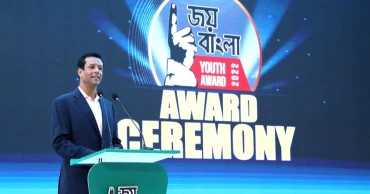Youths
Prof Yunus urges youths to be visionary, shape world they want
Chief Adviser Prof Muhammad Yunus has called on the youth around the world to be more visionary and courageous in transforming their dreams into reality, emphasising their power to create meaningful change in society.
He made the call during a meeting with a delegation of young political activists from Sweden and Norway at the State Guest House Jamuna on Saturday.
“People say youth is the future, I say youth is the present,” Prof Yunus told the visiting group.
“The world is changing fast, and today’s youth are not the same as previous generations. Your upbringing and access to technology make you a different kind of human being, almost a superhuman. All you need to do is ask yourself, ‘What kind of world do I want to create?’ Then commit to it, you have the tools to make it happen," the Chief Adviser said.
Machado dared to imagine a better world, worked tirelessly: Prof Yunus
Led by ambassador Nicolas Weeks of Sweden and Håkon Arald Gulbrandsen of Norway, the delegation featured young political leaders from diverse parties, including Alice Landerholm (Moderate Youth Party), Arian Twana (Social Democratic Youth Party), Anton Holmlund (Liberal Youth Party), Dexter Krokstedt (Sweden Democrats Youth), Hanna Lindqvist (Green Youth Party), and Max Pelin (Christian Democratic Youth Party) from Sweden, and Oda Røhme Sivertsen (Young Conservatives), Lars Mikael Barstad Løvold (Progress Party Youth), and Syver Kleve Kolstad (Red Youth) from Norway.
They were accompanied by UNDP representatives Stefan Liller (Resident Representative, Bangladesh), Caroline Aberg (Deputy Director, Nordic Representation Office), Kirtijai Pahari (Strategic Communications and External Relations Specialist), and Emilie Andresen (Communications Analyst), said the Chief Adviser’s press wing on Sunday.
4 months ago
Three youths crushed under train in Cumilla
Three unidentified youths were crushed to death by a moving train in the Madhupur area of Burichang upazila in Cumilla early Wednesday.
Sohel Molla, in-charge of the Cumilla Railway Police outpost, said the Chattogram-bound train from Dhaka ran over the trio as they were on the tracks during the early hours.
Five crushed under wheels of train in Narsingdi
Upon receiving information from locals, police rushed to the spot and recovered the mangled bodies on the rail line, he added.
Efforts are underway by both the Burichang Police Station and railway authorities to confirm the identities of the deceased.
10 months ago
Drug addiction grips Dhaka’s slum youths
Dhaka's sprawling slums have long been a symbol of hardship, but a worsening crisis is now intensifying the struggles of their residents— the alarming rise of drug addiction.
A field visit to various slum areas reveals a grim reality where substance abuse is tearing apart families and futures.
In Korail slum, Nadia (pseudonym) recounts her father’s tragic downfall. Once a hardworking man, he now spends his days intoxicated, leaving Ripa and her mother to toil as domestic workers to sustain the family.
Their story is not unique as it echoes throughout the slums, where addiction is claiming lives and livelihoods.
Atiya Khatun, another resident, fights a daily battle to survive. “My husband is no longer around. My son used to work in a shop, but addiction took hold of him, and now he refuses to work. I used to clean two houses; now, I clean six just to make ends meet. If I don’t give him money for drugs, he turns violent.”
Sixteen-year-old Sifat, who works in a shop and dreams of going back to school, explains the gravity of the situation: “Many of my friends worked here, but they’ve all been lost to addiction. They use yaba, various pills, cannabis, and other substances. They buy drugs from bars and Raja Bazaar. Their parents don’t even know. They just take money from them and spend it on drugs.”
Poverty and Exploitation
Slum residents pay around Tk 3,500 to Tk 4,000 for a single cramped room, leaving them with little to cover other expenses. Asma Khatun (not her real name) highlights the economic desperation that drives many to extreme measures. “There is barely any work available. Employers offer Tk 4,000-5,000 for an entire day’s labour, but rent alone consumes most of that. Many women are forced to beg or engage in unethical activities just to survive,” she said.
She went on to say, “Addiction is making everything worse. Those who already struggled financially now face an even bleaker future.”
Education: A Flicker of Hope
Despite the hardships, some slum families prioritise education. Nasima, a mother, proudly shares, “My son is studying in a madrasah, and my sister’s two sons are in college and university.”
Russell Sarwar, Inspector of Banani police station, acknowledges the challenge: “Hundreds of thousands of people live in the two parts of Koral slum. We conduct daily raids and arrest an average of 5-6 individuals each day. Many young people here are addicted. Growing up in such an environment makes it hard for them to develop positive habits. However, a few manage to escape through education, and that is encouraging.”
In Rupnagar, Mirpur, the story repeats itself. Fourteen-year-old Shahana was once a student, but addiction shattered her family’s stability. “My father used to work, but now he stays intoxicated. I had to drop out and start working with my mother in homes to survive.”
One anonymous boy shared a personal battle: “I, too, gave in to peer pressure and tried drugs. My parents were furious and forced me back into school, but most of my friends are still addicted.”
Homelessness and Hopelessness
The Malibagh Rail Gate area is home to many families who have lived on the streets for years. Zahurul Haque and his wife reside in a makeshift shelter of plastic sheets. “We barely manage two meals a day. On top of that, we have to pay Tk 5-10 every time we use public toilets. It’s an unbearable burden,” he laments.
The family, like many others, dreams of free public facilities that could ease their suffering.
Expert Insight: Breaking the Cycle
Touhidul Haque, Assistant Professor at the Institute of Social Welfare and Research, Dhaka University, underscores the structural issues behind addiction: “Family plays a crucial role in shaping a child’s future. But in slums, poverty dictates life from birth. Most parents cannot afford proper education, leaving their children vulnerable to crime and substance abuse. A few manage to break free, but for many, addiction becomes a lifelong struggle.”
The rising addiction crisis among Dhaka’s slum youth is not just a personal tragedy—it is a societal emergency. As addiction fuels financial ruin and social decay, experts stress the need for comprehensive interventions, including education, job opportunities, and rehabilitation programmes. Without urgent action, the cycle of addiction and poverty will continue to trap generations in despair.
Dhaka, the capital of Bangladesh, has over 5,000 slums housing approximately four million people. One of the largest among them is Korail, which spans about 100 acres and is home to more than 50,000 residents.
The issue of slum dwelling is not unique to Bangladesh; as of 2022, 24.8% of the world's urban population lived in slums. In Sub-Saharan Africa, this figure was even higher at 53.6%, the highest percentage of any major region. In contrast, Australia and New Zealand reported no urban slum populations that year.
Globally, slum populations continue to rise. The UN estimates that 1.1 billion people currently live in slums or slum-like conditions in cities, with an additional two billion expected to do so over the next 30 years. This growing urban challenge underscores the urgent need for sustainable housing solutions and inclusive urban planning to accommodate expanding city populations.
1 year ago
Bangladesh envoy in Canada highlights vital role of young people in nation-building
High Commissioner of Bangladesh to Canada Nahida Sobhan has underscored the vital role of young people in nation-building.
During a panel discussion at the Youth Festival in Toronto, she commended the commitment and unity exhibited by Bangladeshi-origin youth in Canada during the 2024 movement.
The envoy highlighted the critical role of young voices in driving sustainable nation-building efforts.
“The High Commission remains fully committed to engaging with Bangladeshi-origin youth in Canada, empowering them to be catalysts for progress and representing Bangladesh’s dynamic potential,” said the high commissioner, according to a message here.
The High Commission of Bangladesh in Ottawa, in collaboration with Progressive Action for Community Empowerment (PACE), hosted an event at the Albert Campbell Public Library in Toronto on January 18 as part of the ongoing Youth Festival 2025, an initiative by the government of Bangladesh.
The event, themed “Let’s Change the Country, Let’s Change the World,” served as a platform for Bangladeshi-origin youth in Canada to explore their role in shaping a progressive and inclusive Bangladesh.
A diverse group of students and young professionals who actively supported and organized protest events in Toronto during the historic July–August 2024 movement in Bangladesh attended the gathering.
A Davos-style panel discussion was the key highlight of the event, where participants shared innovative ideas and solutions to address critical challenges facing Bangladesh’s future.
Srijoni Rahman, one of the young panelists, emphasised the transformative potential of the Bangladeshi diaspora in driving positive change.
While thanking the High Commission of Bangladesh in Canada, she said Bangladeshi foreign missions should encourage youth engagement and foster a positive mindset so that the youth of the Bangladeshi diaspora can meaningfully contribute to Bangladesh’s transformation.
She also said Bangladesh has always been a model and an inspiration for youth-led movements, and youths have always been catalysts for bringing about change.
Read: Environment Minister urges youths to adopt Sheikh Kamal's ideals for nation-building
"We should draw lessons from our values – the values derived from our War of Independence in 1971 and the July-August movement – to ensure social justice and equity.”
Another panelist Urbi Khan, a youth representative from the Bangladeshi community and a journalist at the Toronto Star, reminded the audience that the youth have always been the vanguard of change in Bangladesh’s storied history, including during the recent July-August movement.
She maintained that Bangladesh itself is the cherished fruit of revolutionary struggles, nurtured by the sacrifices and indomitable spirit of its people.
1 year ago
Sylhet’s Bishwanath sees alarming rise in drug abuse
The easy availability of drugs has led to a sharp rise in the number of addicts, particularly among youths and the unemployed, as well as drug dealers in Bishwanath upazila of Sylhet, which is predominantly inhabited by expatriate families.
Drug peddling, involving substances such as Yaba, phensidyl, heroin, and others, occurs rampantly after dusk in designated spots throughout the upazila.
It appears that there is little effective control over these activities, said locals.
Drug use and sales are not confined to private spaces, as individuals openly or covertly engage in these activities.
Alarmingly, the problem has extended beyond young people to include teenagers and even older adults.
Parents of drug-addicted teenagers and young adults are struggling to cope with the devastating impact.
The growing prevalence of drug abuse among the youth has become a big concern in the area and Bishwanath upazila seems to have turned into a sanctuary for drug dealers, leaving many residents too afraid to voice their concerns.
Locals said drug dealers employ techniques to lure new users and expand their networks. Often, they offer free drugs to unemployed youths enticing them into addiction.
These recruits are then persuaded to bring in more users, creating a vicious cycle.
Once addicted, many young individuals are coerced into working as agents, transporting drugs in exchange for money and free supplies.
This deepens their addiction, and some eventually resort to petty theft to fund their habits, exacerbating crime rates in the region.
Read: Rampant use of antibiotic drugs causing health hazards
Drugs are reportedly available different areas including New Habra Market, Old Habra Market, Bairagi Bazar, Rampasha Bazar, Aguganj Bazar, and Kaliganj Bazar.
Known drug hotspots, such as Old Habra Market, are frequented by both locals and outsiders, with motorcycles often seen transporting unknown people involved in drug-related activities.
Notorious drug dealers, including Asman Ali, Suhel, and Kamal in Old Habra Market, and others like Islam Ali and Dilwar in Bairagi Bazar, have been identified.
Despite occasional arrests, many return to the drug peddling after serving time in jail.
Besides, Lamakaji area has become a key route for smuggling drugs into the region, with consignments often transported across the Surma River by boat in the early hours before being distributed by autorickshaws.
Bairagi Bazar Traders’ Association President Monu Mia and former ward No- 4 Councillor Muhibur Rahman Bacchu, have expressed grave concern about the growing drug problem.
They fear the social fabric of Bishwanath may collapse without immediate intervention from both the community and authorities.
Abdul Rob, Officer-in-Charge of (investigations) of Bishwanath police station, emphasized the police’s "zero-tolerance" policy toward drugs.
“We are conducting weekly arrests of drug dealers and planning more extensive operations to tackle the issue,” he said.
Read more: Huge haul of drugs busted at Chapainawabganj border: BGB
Residents urged an increased collaboration between local communities and law enforcement to curb the spread of drugs.
They stress the need for proactive measures to safeguard the youth and preserve societal stability in Bishwanath.
1 year ago
Students with Depression: Tips for Parents and Educators
Depression among students is a critical issue that demands urgent attention. The gravity of this problem magnifies the alarming rise in dropouts from colleges, study breaks, drug addictions, even suicidal attempts among students. As parents and educators, it is essential to be proactive in addressing this crisis through understanding, support, and guidance. Let’s take a look into how to prevent depression in students.
Common Reasons for Depression among Students
Depression among students can be attributed to various factors, and understanding these reasons is the first step in prevention. Here are some common causes:
- High expectations and academic stress can lead to feelings of hopelessness
- Loneliness and a lack of social support can make students vulnerable to depression and suicidal thoughts
- Bullying, whether in person or online, can devastate a student's mental health
- Drug or alcohol abuse can exacerbate depression and increase the risk of suicide
- Relationship problems can be a major source of stress and anxiety for students
- Conflict with their parents, siblings, or friends can make them isolated and alone
- Economic constraints and worries about the future can take a toll on a student's mental health
- Traumatic events during childhood, like physical or emotional abuse or loss of a parent increase the risk of depression
- Mental health conditions, such as bipolar disorder, and anxiety disorder can trigger depression
- Having certain personality traits, such as low self-esteem or being overly dependent, self-critical, or pessimistic is a reason for depression.
Read more: Protecting Your Child’s Mental Health: 10 Tips for Parents
2 years ago
2 youths killed in separate road crashes in capital
Two youths were killed in separate road accidents in the capital’s Ramna and Matuail areas early Friday, police said.
In the Ramna accident, businessman Abdullah Limon, 30, sustained severe injuries when a speeding truck crashed into his motorbike near the Justice Residence around 1:45am.
Limon, from Manikganj’s Ghior upazila, was rushed to the Emergency Department at Dhaka Medical College Hospital where physicians declared him dead around 2:30am, confirmed Mujahidul Islam, sub-inspector at Ramna police station. The truck driver was detained and the vehicle was also seized soon after the accident, SI Mujahidul added.Limon's body was kept at the hospital morgue for autopsy. His paternal uncle Md Alam said Limon was returning to Narayanganj from the capital’s Mirpur after attending a wedding ceremony. He had a Navana Battery dealership in Narayanganj’s Balu Math area.
In the other fatal mishap, an unidentified youth aged around 35 was killed in what looked like a hit-and-run, but there were no witnesses. An unknown vehicle knocked him down while he was crossing the Dhaka-Chattagram Highway in the Matuail area around 3am, leaving him dead on the spot, said Mostafizur Rahman, sub-inspector at Jatrabari police station.
The body was sent to the DMCH morgue for autopsy, the SI said, adding that they were trying to identify the youth.
2 years ago
Youths will take Bangladesh forward with merit, hard work and patriotism: Sajeeb Wazed
People of Bangladesh are capable of solving their own problems, said Prime Minister Sheikh Hasina's ICT Adviser Sajeeb Wazed Joy — conveying his note of optimism that youths will drive Bangladesh forward by overcoming the crisis gripping the world as a war rages on.
Speaking at the sixth installment of Joy Bangla Youth Award at Sheikh Hasina Jubo Unnoyon Institute in Savar, he said, "You know that the world is undergoing a crisis. A war is going on, and so are problems. We dealt with the Covid-19 crisis just two years ago. Coming hot on its heels are a war, terrorism, and price hike. Financial pressure is building up."
Addressing the fear among many about how the country would go forward amid all these problems, he said, "You (youths) are the examples of solving problems. There is no end to problems. We, Awami League, have been in power for 14 straight years. How many problems did we face?"
"Power outage was the first one. How would we solve the load shedding problem? Then comes the economy. How will so many people be fed? How will this economy advance? We proved that all these problems could be solved," he said.
Read: Young Bangla celebrates the power of changemakers at the grassroots
Reflecting on the Covid-19 pandemic in 2020, he said, "Then came Covid. Everyone was scared. Apprehension set in across the whole world. But, what did we see? In Bangladesh, we managed it in our own way and with our own plans. We have dealt with it in a smarter way than most countries in the world, even better than some of the richest countries."
"It fills my heart with joy seeing that you (youths) are making a robotic hub. It is brilliant. You are sending representatives to the UN to place demands on climate change. That is outstanding," he added.
Praising everyone for working in unison, he said, "You are amazing! our country is an outstanding country. We fought and shed blood to liberate our country. We earned the capability to ensure food for 16 crore people. Within 10 to 15 years, we have enabled the transition of this country of 16 crore people from lower to middle-income status."
"These youths, these winners of Young Bangla — you are the future! You will drive the country forward. I believe that you will transform middle-income Bangladesh into a high-income one. We will see that in our lifetime."
"We will achieve it with our hard work. We will solve our own problems with our merit. If we have confidence and patriotism, it is possible to do anything for our country and the people," he added.
Expressing the hope that youths would build future Bangladesh, he said, "The only word I am left with to express my feelings is 'outstanding'. Not just the awardees, but also the finalists and 600 participants are all victorious today."
Read: Young Bangla: Recognising, grooming, connecting young changemakers
"Undoubtedly, the way you are working for the country and its people is an example for all citizens and the world as well. Without reaching out to anyone for help, youths like you are working with your own efforts, with your own merit and thoughts. You are not waiting for anyone. This is our spirit."
The sixth instalment of Joy Bangla Youth Award commenced at 3:00 PM on Saturday with the national anthem. A documentary on Young Bangla's activities was displayed in the beginning. Around 600 youth-led organizations applied for the award. Among them, 28 were given the tickets for the final round. In the end, 10 organizations were awarded under five categories. Two were honoured with lifetime achievement award.
In the welcome speech, State Minister for Power, Energy and Mineral Resources and CRI Trustee Nasrul Hamid Bipu said, "Six years went by so fast. Today Young Bangla has 3.5 lakh members."
Addressing youths, he said, “You are giving your best from different parts of the country. The jury board was represented by iconic people of the society. Heartfelt thanks to everyone!”
3 years ago
4 youths, among 7 arrested, members of new militant group: Rab
Four youths, among the seven arrested, had left their homes to join the newly formed militant group ‘Jamatul Ansar Fil Hindal Sharqiya’, Commander Khandaker Al Moin, director of Rab’s Legal and Media Wing, has said.
Some leaders and activists of banned militant groups including Jamaat-ul-Mujahideen Bangladesh (JMB), Ansar Al Islam, and Harkat-ul-Jihad-al Islami Bangladesh (HuJI-B) formed the new group, he said.
Read:Rab arrests 7 including 4 with suspected ties to radical groups
The Rab official disclosed the information at a media briefing on Thursday in Dhaka’s Karwan Bazar over the arrest of seven people, including four who went missing from their homes in Cumilla and elsewhere with suspected ties to radical groups.
The arrestees were identified as: Hossain Ahmed, 33, son of Maulana Abu Taher, Nesar Uddin alias Umayer, 34, son of Matier Rahman, Bani Amin, 27, son of Delwar Hossain, and Md Sabit, 19, son of Hasan Mir — all from Patuakhali district; Imtiaz Ahmed Rifat, 19, son of Foyez Ahmed, and Hasibul Islam, 20, son of Shahab Uddin from Cumilla; and Roman Shikdar, 24, son of Anis Shikdar of Gopalganj.
Tipped off, a team of Rab-11 conducted separate drives in Munshiganj, Narayanganj and Mymensingh districts and arrested them.
The elite force also seized some leaflets, books on radical views and a tab from the arrestees, said Commander Khandaker Al Moin said.
According to arrestee Hossain Ahmed’s statement, who used to teach at a madrasa in Patuakhali, the activities of this new militant group started in 2017 – by merging some members from various banned militant outfits, said the Rab official.
“In 2019, ‘Jamatul Ansar fil Hindal Sharqiya’ (Jamatul Ansar of Eastern Hind) was formed. Some leaders and activists of banned militant groups of Bangladesh including Jamaat-ul-Mujahideen Bangladesh (JMB), Ansar Al Islam and Harkat-ul-Jihad-al Islami Bangladesh (HuJI-B), joined in to start the activities of this new militant group,” he added.
Hossain was in charge of recruiting and supervising members for this new militant outfit.
Based on Bani Amin’s information, Rab arrested Nesar from Dhaka-Mymensingh highway area. Nesar was a scientific officer in a government institution in Bhola and got involved in militant activities before 2019.
Read: 7 young men missing from Cumilla since Aug 23
Hossain, Rifat, Hasib, Roman, and Sabit were arrested from Siddhirganj area of Narayanganj following Nesar’s information, said the Rab Commander.
During primary interrogation, the arrestees revealed that Hasib and Rifat came to know about the organisation from Habibullah, imam of Koba Mosque in Cumilla, a year ago. Later, Habibullah inspired them to get involved in extremist activities.
Rifat was a first year honours student of Economics in Cumilla and Hasib was a higher secondary student there. They went missing on August 23.
Commander Moin said Roman got involved in extremism and remained missing for the last 40 days while Sabit disappeared from Patuakhali two months ago.
“Among the eight young men who had gone missing from Cumilla, Sartaz Islam Niloy, 22, returned to his Kalyanpur home on September 1 and later Rab took him into custody. Following interrogation, Rab came to know details on others,” he said.
They were trained in char areas in Bhola and Patuakhali districts and so far, 15-20 people have joined the new group, said Moin.
Seven students, aged 17-25, belonging to different institutions in Cumilla have been missing since August 23. They all knew each other, and left home without their mobile phones. A general diary was lodged with Kotwali Model Police in this regard.
After that, reports came to light of seven more youths missing from Patuakhali, Dhaka, Narayanganj and Gopalganj for two to three months under similar circumstances.
Besides, four youths from Sylhet have been missing since 15 November last year.
3 years ago
Two youths die after jumping into canal from building in Chattogram
Two youths died after jumping into a canal from the fourth floor of a building in Lohar Bridge area of Chattogram on Saturday, said police.
The deceased were identified as Mamun, 18, and Hridoy, 13. They were residents of Mohajanpara under Bakolia police station.
Md Abdur Rahim, Officer-in-charge (OC) of Bakolia Police Station, said the youths were taking bath at Chaktai canal in the Lohar Bridge area around 3:30pm.
Read: DU student jumps off 16-story building, dies
They jumped into the canal from the building during the bath and an iron rod entered through the throat of one of the victims while legs of another got struck in mud, he said.
Later, rescuers of the Fire Service and Civil Defense department recovered the bodies from the water body, said the police officer.
The bodies were sent to Chattogram Medical College Hospital morgue for autopsy, added the OC.
3 years ago



















